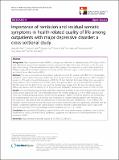| dc.contributor.author | Woo, Jong-Min | en_US |
| dc.contributor.author | Jeon, Hong Jin | en_US |
| dc.contributor.author | Noh, Eunsun | en_US |
| dc.contributor.author | Kim, Hyo-Jin | en_US |
| dc.contributor.author | Lee, Sun Woo | en_US |
| dc.contributor.author | Lee, Kyung Kyu | en_US |
| dc.contributor.author | Kim, Sung Hwan | en_US |
| dc.contributor.author | Hong, Jin Pyo | en_US |
| dc.date.accessioned | 2015-01-05T18:28:19Z | |
| dc.date.issued | 2014 | en_US |
| dc.identifier.citation | Woo, Jong-Min, Hong Jin Jeon, Eunsun Noh, Hyo-Jin Kim, Sun Woo Lee, Kyung Kyu Lee, Sung Hwan Kim, and Jin Pyo Hong. 2014. “Importance of remission and residual somatic symptoms in health-related quality of life among outpatients with major depressive disorder: a cross-sectional study.” Health and Quality of Life Outcomes 12 (1): 188. doi:10.1186/s12955-014-0188-y. http://dx.doi.org/10.1186/s12955-014-0188-y. | en |
| dc.identifier.issn | 1477-7525 | en |
| dc.identifier.uri | http://nrs.harvard.edu/urn-3:HUL.InstRepos:13581235 | |
| dc.description.abstract | Background: Major depressive disorder (MDD) is strongly associated with an impaired quality of life (QoL), which is itself affected by various factors. Symptom-oriented ratings poorly reflect the impact of disease on the QoL and level of functioning of the mental health of subjects. The purpose of this study was to assess health-related QoL (HRQoL) using preference-based measures in outpatients with MDD with regard to their remission achievement and clinical factors affecting the HRQoL. Methods: This was a cross-sectional observational study. We recruited 811 patients with MDD from 14 psychiatric outpatient clinics in Korea. They were divided into three groups as follows: a new visit group (n = 287), a remitted group (n = 235), and a non-remitted group (n = 289). The 17-item Hamilton Depression Rating Scale was used to assign patients to the remitted or non-remitted group. The general HRQoL was assessed with the EuroQol 5D (EQ-5D), using both the EQ-5D index score and the EuroQol Visual Analog Scale (EQ-VAS). The disease-specific HRQoL was assessed with the Quality of Life Enjoyment and Satisfaction Questionnaire Short Form (Q-LES-Q-SF). Results: The non-remitted group showed a significant impairment of HRQoL in view of the subscales of EQ-5D index scores, EQ-VAS, and Q-LES-Q-SF. The EQ-5D index score in the remitted group was 0.77 ± 0.10, while it was 0.57 ± 0.23 in the non-remitted group and 0.58 ± 0.24 in the new visit group (p < 0.0001). The EQ-VAS scores for the remitted and non-remitted groups were 72.5 ± 16.6 and 50.9 ± 20.3, respectively (p < 0.0001). Likewise, patients with remission had the Q-LES-Q-SF total score of 46.5 ± 8.8, whereas those with non-remission reported 36.7 ± 7.7 (p < 0.0001). The symptom severity measured by the Depression and Somatic Symptoms Scale was significantly correlated with the HRQoL. Furthermore, patients with severe somatic symptoms showed a significantly lower EQ-5D index score (0.54 ± 0.24) than those with mild/moderate somatic symptoms (0.75 ± 0.12; p = 0.002). Conclusion: Non-remitted MDD patients, especially those with more severe somatic symptoms, show a distinct impairment of HRQoL and more clinical symptoms, suggesting the importance of achieving remission in the treatment of MDD. | en |
| dc.language.iso | en_US | en |
| dc.publisher | BioMed Central | en |
| dc.relation.isversionof | doi:10.1186/s12955-014-0188-y | en |
| dc.relation.hasversion | http://www.ncbi.nlm.nih.gov/pmc/articles/PMC4280041/pdf/ | en |
| dash.license | LAA | en_US |
| dc.subject | Major depressive disorder | en |
| dc.subject | Quality of life | en |
| dc.subject | EQ-5D | en |
| dc.subject | Q-LES-Q-SF | en |
| dc.title | Importance of remission and residual somatic symptoms in health-related quality of life among outpatients with major depressive disorder: a cross-sectional study | en |
| dc.type | Journal Article | en_US |
| dc.description.version | Version of Record | en |
| dc.relation.journal | Health and Quality of Life Outcomes | en |
| dc.date.available | 2015-01-05T18:28:19Z | |
| dc.identifier.doi | 10.1186/s12955-014-0188-y | * |
| dash.authorsordered | false | |


